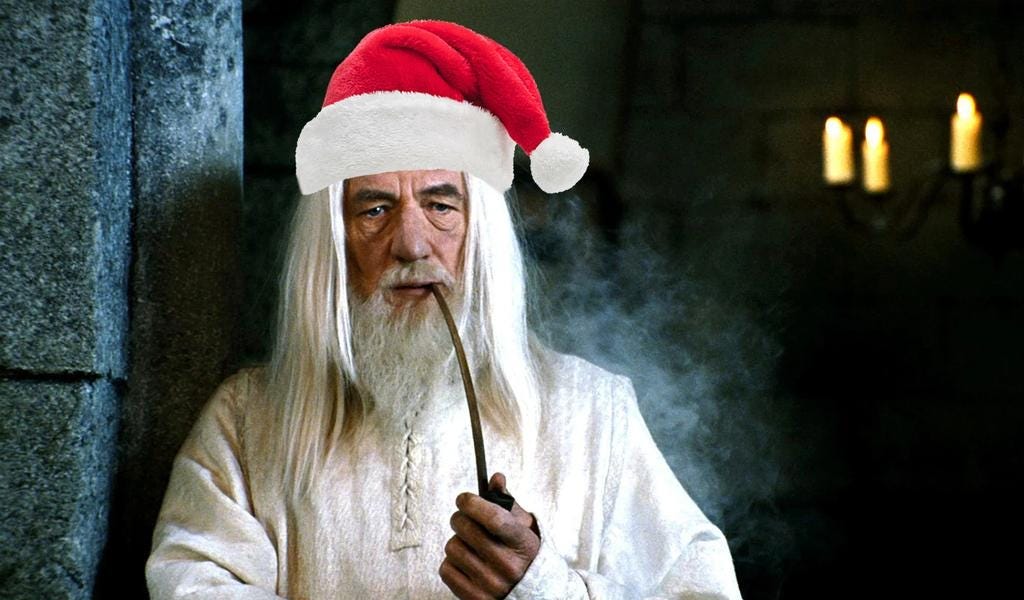If "Die Hard" Is a Christmas Movie...
On the implications of the Christmas stories we canonize
In a recent Q&A on his Instagram account Sword & Pencil, Josh Nadeau (who writes on Substack at
) insightfully answered the ever-popular question, “Is Die Hard a Christmas movie?” While the Instagram story has passed the 24-hour mark and expired, his answer was essentially that movies like Die Hard (1988) are not awarded the label of Christmas Movie because they merely take place at Christmastime; Christmas movies are—or should be—designated as such because they celebrate something about the beauty of the Advent, of the Incarnation. He also noted that non-Christmas movies can be deemed Christmas Movies in theory if they have “incarnation” aspects which point to the Advent. While Josh’s response was brief, it struck me, and inspired some thoughts (which I hope Josh would agree with) about how to engage film at Christmastime.If Die Hard is a Christmas Movie…
There’s a certain futility to re-hashing the debate of whether Die Hard is a Christmas Movie. I recently re-watched it; my review on Letterboxd was simple, but enough to cause a stir: “Not a Christmas movie.” I don’t have many followers on the movie-logging app—I mostly use it for the data I can personally review—but I still got some immediate responses in disagreement. I think it may be better to categorize the terrorist-fighting tower-thriller as a movie that merely evokes the holiday for tangential purposes—perhaps, um, for vibes and comedy (“Now I have a machine gun, ho-ho-ho”). But, hey, it’s still a great holiday watch.
So, how can I enjoy it around the Christmas season and also adamantly oppose it as a Christmas Movie? Because those films we call Christmas Movies, we agree to—at least unintentionally—canonize among the requisite pieces of art which define the Christmas season.
It may be good practice to compare the Christmas movies fueling our cultural zeitgeist to the real meaning of Christmas—however trite that may sound. “If [insert movie title] is a Christmas movie,” we might question, “then what is Christmas all about? What have we to celebrate, to ruminate upon, to cherish?”
If Die Hard is a Christmas movie, then perhaps Christmas is all fear and tension and blood and gunshots. The songs we sing—such as “Joyful, Joyful, We Adore Thee”—are only invoked at the most secular accomplishments: Perhaps as the door swings open on the $600 million safe we, through blood and death, breached. The “magic” of Christmas is seen through happenstance as the F.B.I. tells a clueless electrician to cut the power to Nakatomi Plaza, bypassing its security protecting the money. “It’s Christmas, Theo,” Hans Gruber claims, “it’s the time for miracles. Be of good cheer.” The Advent we celebrate is not of the Messiah, God with us, but of the police cavalry coming to save—or further ruin—the day. There are indeed respectable themes in Die Hard: fighting for one’s nation, protecting family, and serving the common good. But if Die Hard is a Christmas movie, perhaps we have no one else to rely upon, no savior to push back the darkness; we must do it all ourselves.
Good Routine Fun
Let me be clear: Die Hard is good fun, especially at Christmas. I’m not asserting that we should purge our Christmas movie watchlists. There’s no way I’m giving up National Lampoon’s Christmas Vacation (1989), even though the meaning of Christmas according to the Griswolds is barely keeping it together until the bonus check arrives. But, like so many now-commercialized aspects of the holiday season, perhaps canonizing films like these as Christmas Movies becomes a nullifier of the spiritual and powerful truths of Christmas. There are many wondrous traditions we have at Christmas that don’t relate directly to the Advent—be they seeing Christmas lights in one’s hometown or baking cookies and goodies for neighbors. We don’t have to give those up, but we should recognize that they contribute to our continued commercialization of Christmas. G.K. Chesterton warns against doing so, writing with precision about what we should denounce:
Christmas is a contradiction of modern thought. . .Moving step by step, in the majestic march of Progress, we have first vulgarised Christmas and then denounced it as vulgar. Christmas has become too commercial; so many of these thinkers would destroy the Christmas that has been spoiled, and preserve the commercialism that has spoiled it.1
He also warns against allowing the ritual to become routine:
[L]ike any other good thing, [Christmas] has suffered much less from the heat of fanatical foes than from the coldness of frigid friends. Fanaticism only encouraged the devout to be defiant, and they resolutely repeated it as a ritual; it was much more in peril of death where people only repeated it as routine. . .The essence of real ritual is that a man does something because it signifies something; it may be stiff or slow or ceremonial in form; that depends on the nature of the artistic form that is used. But he does it because it is significant.2
Smith commentates on Chesterton, saying that people participate in ritual as “a conscious, intentional observance, a deliberate remembering,” while routine “is more akin to muscle memory: something we do, but without any sense of intrinsic significance.” He reiterates: “If we are not careful, we can allow our rituals to become routines: commonplace, comfortable, informal, feeble, boring.”3
Chesterton, of course, is a staunch supporter of Christmas as fun. He even argues that God is the origin and purveyor of fun, that he never tires from his creation, nor finds the Beautiful routine or monotonous. In that famous paragraph from Orthodoxy, he writes:
It is possible that God says every morning, "Do it again" to the sun.; and every evening, "Do it again" to the moon. It may not be automatic monotony that makes all daisies alike; it may be that God makes every daisy separately, but has never gotten tired of making them. It may be that He has the eternal appetite of infancy; for we have sinned and grown old, and our Father is younger than we.4
Perhaps we would do well to fall in love anew with the ritual of Christmas—with the glory of that old, traditional Christmas story. The birth of the man called Jesus Christ, in whom the fullness of God was pleased to dwell (Col. 1:19).
The Case for The Lord of the Rings as Christmas Movies
So, which films should we canonize? Which stories should go to bat, as it were, for Christmas? That’s something you’ll have to answer yourself. But to echo Josh Nadeau’s point, I’d argue that there are many non-Christmas movies worthy of canonization in our incarnation-centric art gallery; The Lord of the Rings: The Fellowship of the Ring is perhaps the best example—and not just for the reasons that
listed in a fun article.If Fellowship—and the whole trilogy, for that matter—is a Christmas movie, then what is Christmas all about? Our songs are those of old legends and the wonders of nature and the valiant and virtuous creatures of the world. Our nights are spent around pipe-weed and good company, over a pint and the exultation of the ordinary. Our hope lies in the the death of evil, in the long defeat of pain, the arrival of someone who will bear all our tragedies away, and the coming glory beyond the Grey Havens.
As you watch Die Hard, I hope you enjoy it! It’s a riveting battle of wits and violence led by great performances from Bruce Willis and Alan Rickman. I also hope you ponder what it means that such stories are cherished as Christmas Movies, and seek to push back against the routine of the Christmas season. Perhaps in other, “non-Christmas” films you’ll find themes of the Advent, of the incarnation, of nations that long in darkness walked, of hope and peace and joy, of darkness retreating—and there dwell on the wonder of Christmas.5
Cited in Ryan Whitaker Smith, Winter Fire: Christmas with G. K. Chesterton (Chicago: Moody Publishers, 2023), 31–32.
Cited in Smith, Winter Fire, 75.
Smith, Winter Fire, 76–77.
G.K. Chesterton, Orthodoxy, with annotations by Trevin Wax (Nashville, TN: B&H Academic), 88.
Might I suggest a few? Return of the Jedi (1983); Beauty & the Beast (1991); The Chronicles of Narnia: The Lion, The Witch and the Wardrobe (2005); The Lord of the Rings trilogy, of course; Little Women (2019); Klaus (2019); The Irishman (2019); The Green Knight (2021).






I'm sold.
Also, Joyful Joyful We Adore Thee isn't an Advent or Christmas hymn...
I think Christmas movies can be on a spectrum from true Christmas movies that celebrate Christ to pseudo Christmas movies that celebrate Santa to nominal Christmas movies that merely take place during the Christmas season without the plot revolving around the meaning of Christmas